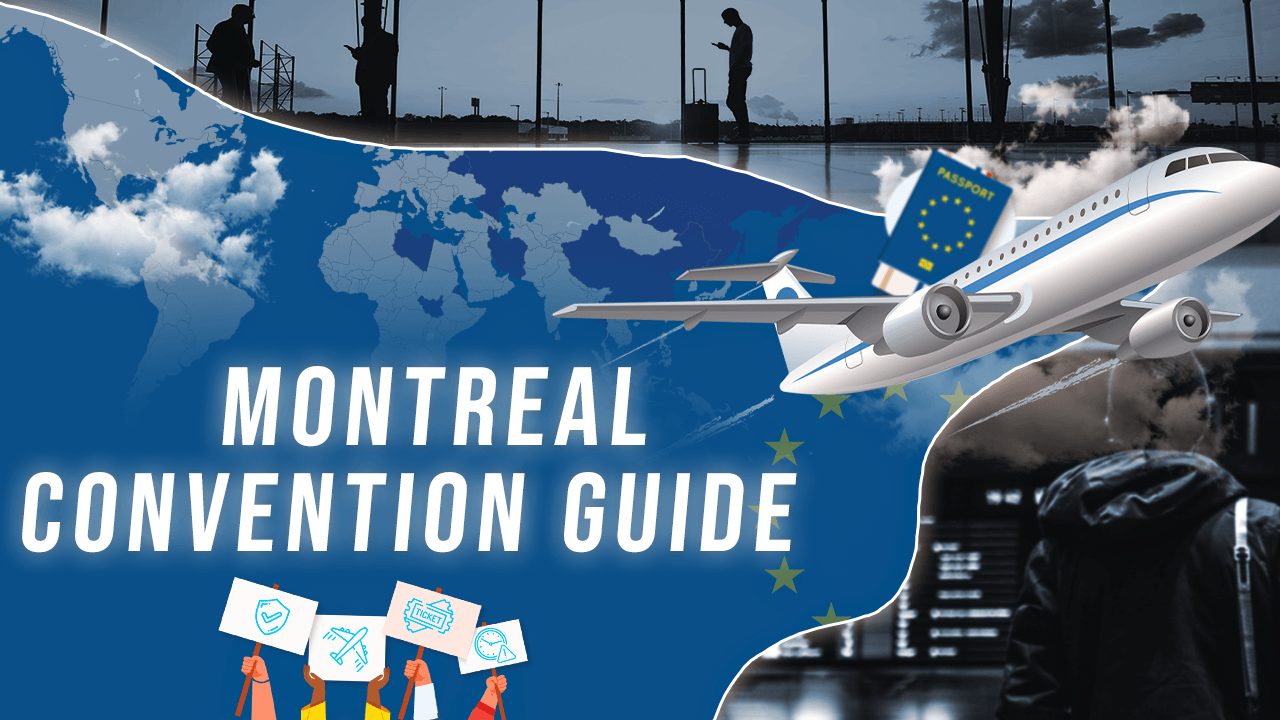You have rights when you fly internationally, thanks to the Montreal Convention, so you don’t have to worry if you face damages while flying. It is in place to help protect you, but it’s a little more gray than some of the other flight compensation laws on the books. In this guide, we will aim to shed light on this vital international air travel agreement. We’ll clarify its role, application, and relevance to you as a traveler, helping you better understand and leverage the protections it affords you, even when your flight doesn’t go as smoothly as expected. Information in this article was updated in 2026.
Key Takeaways
- The Montreal Convention, effective from 2003, offers protections for international air travelers for a variety of issues such as personal injuries, flight delays, and lost or damaged luggage. It works on a case-by-case basis and doesn’t have a fixed compensation amount, unlike some other flight regulations.
- Damages resulting from flight disruptions are the primary focus of the Montreal Convention. Passengers can file claims for unforeseen expenses incurred due to flight disruptions, such as costs for hotel stays or meals. Compensation can reach up to €7,000 for these damages.
- The Montreal Convention also covers luggage issues. If a passenger’s luggage is lost, delayed, or damaged, a claim can be filed for up to €1,700 in compensation. It’s important to file these claims within the specified time limits.
- The Montreal Convention applies to international flights between member countries. With over 135 member countries and territories, the Montreal Convention covers a majority of global air travel. However, it’s important to note that domestic flights typically do not fall under the scope of the Montreal Convention.
- Claims under the Montreal Convention can be filed directly with the airline or through a specialized company. To ensure a successful claim, passengers need to provide thorough documentation, including flight information, delay notices, receipts for additional expenses, and other relevant evidence.
What is Montreal Convention?
The Montreal Convention is Canada’s answer to the European Union’s EC 261, though it was put in place back in 2003 – predating many modern regulations. It protects the millions who travel internationally, including those who face damages, health issues, luggage problems, delayed or canceled flights, and more. Unfortunately, there are no clear guidelines about compensation amounts, so it views each claim on a case-by-case basis.
As you travel, it’s important to know what your rights are if you face one of these issues. Airlines can prevent a lot of issues, and the more you hold them accountable, especially under global regulations like the Montreal Convention, the more likely it is that change will occur for the better.
What’s Covered Under the Montreal Convention?
The Montreal Convention codifies what financial responsibility airlines carry in the face of unforeseen circumstances. This includes any personal injury or death that occurs as a result of a flight, as well as delays, damages, lost baggage or cargo, and more. It sought to be a single, universal treaty to help govern airline liability around the world; however, since then, many countries and continents have put in additional regulations to apply to their jurisdiction alone.
What Compensation Can I Get?
Montreal Convention is a little tricker than some of the other airline compensation laws around the world because it’s not specific as to the amounts that you can claim. For example, EU261 spells out that you are entitled to receive based on your flight miles and the length of your delay, so when you submit a claim, there’s no question. However, that may actually work in your favor because the limits are much higher, and you can qualify in different areas for maximum compensation.
Damages Claims
If your flight is delayed, canceled, or overbooked, you can file a claim for damages under the Montreal Convention. This includes any unforeseen expenses due to air travel problems, including if you have to pay for hotel reservations, meals, and more. Whatever you incur as a result of your missed flight, as long as it’s a result of the airline’s fault, you can claim up to €7,000. This is generous, so there’s a lot of wiggle room that could qualify various expenses that may not have otherwise applied.
Luggage Issues
The Montreal Convention also covers when you have issues with your luggage. This can include if your bags are:
- Damaged.
- Lost.
- Delayed.
You can claim up to €1,700 when there’s an issue with your luggage under the Montreal Convention, which is much more generous than other similar regulations. If you have to purchase clothing as a result of luggage problems, this qualifies under the damages claims.
If you’re seeking compensation, you want to file a claim as soon as possible. There are strict time limits that could impact your ability to receive financial restitution. These rules are intended to protect both the passenger and airlines, so remember they must be issues within the airline’s control in order to qualify.
Montreal Convention Countries
Much like EU261, there are select countries that are part of the Montreal Convention. The good news is that there are more than 135 countries and territories that are currently included in the Montreal Convention. That means that this important regulation applies to all international flights between these eligible countries and territories, protecting your rights for additional peace of mind.
The good news is that most major aviation hubs are members of the Montreal Convention, including European Union member states and United Nations member states. If you have questions, please see below for a full list of Montreal Convention countries.
| Countries | ||
|---|---|---|
| Albania | Fiji | North Macedonia |
| Argentina | Finland | Norway |
| Armenia | France | Oman |
| Australia | Gabon | Pakistan |
| Austria | Gambia | Panama |
| Azerbaijan | Georgia | Paraguay |
| Bahamas | Germany | Peru |
| Bahrain | Ghana | Philippines |
| Bangladesh | Greece | Poland |
| Barbados | Guatemala | Portugal |
| Belgium | Guyana | Qatar |
| Belize | Honduras | Republic of Korea |
| Benin | Hungary | Republic of Moldova |
| Bolivia | Iceland | Romania |
| Bosnia and Herzegovina | India | Russian Federation |
| Botswana | Indonesia | Rwanda |
| Brazil | Ireland | Saint Vincent and the Grenadines |
| Brunei Darussalam | Israel | Saudi Arabia |
| Bulgaria | Italy | Senegal |
| Burkina Faso | Jamaica | Serbia |
| Cabo Verde | Japan | Seychelles |
| Cambodia | Jordan | Sierra Leone |
| Cameroon | Kazakhstan | Singapore |
| Canada | Kenya | Slovakia |
| Central African Republic | Kuwait | Slovenia |
| Chad | Latvia | South Africa |
| Chile | Lebanon | Spain |
| China | Lithuania | Sri Lanka |
| Colombia | Luxembourg | Sudan |
| Congo | Madagascar | Sweden |
| Cook Islands | Malaysia | Switzerland |
| Costa Rica | Maldives | Syrian Arab Republic |
| Côte d’Ivoire | Mali | Thailand |
| Croatia | Malta | Togo |
| Cuba | Mauritius | Tonga |
| Cyprus | Mexico | Tunisia |
| Czech Republic | Monaco | Turkey |
| Democratic Republic of the Congo | Mongolia | Uganda |
| Denmark | Montenegro | Ukraine |
| Dominican Republic | Morocco | United Arab Emirates |
| Ecuador | Mozambique | United Kingdom |
| Egypt | Namibia | United Republic of Tanzania |
| El Salvador | Nepal | United States |
| Equatorial Guinea | Netherlands | Uruguay |
| Estonia | New Zealand | Vantuatu |
| Eswatini | Niger | Viet Nam |
| Ethiopia | Nigeria | Zambia |
Which Flights Are Covered by Montreal Convention?
The Montreal Convention is very broad, so thankfully, there are a lot of situations that qualify. These include, but are not limited to:
- Flight delays.
- Flight cancellations.
- Overbooking.
- Injury or death caused as a result of a flight.
- Loss of luggage.
- Damaged luggage.
It’s important to note that the Montreal Convention only applies to the damages that result from your flight disruption, not the flight itself. In most cases, damages mean financial costs. If you incurred additional costs as a result of the flight issue, the Montreal Convention applies. When you submit a claim, you’ll be required to submit documentation, so make sure you keep all receipts and bills.
For example, if you had to stay an extra night at a hotel, order food and drink during a delay, buy clothing because of lost luggage, and so on, these all would qualify as damages. You only had to pay for them because of the airline’s fault, and they are liable under the Montreal Convention.
The amount of which will vary. You can claim up to €7,000 in material damages and €1,700 for lost luggage damages.
International Flights
One of the most important rules for the Montreal Convention is that your flight must be international, and you must have touch points in member countries to qualify. Domestic flights within the same country typically do not apply, though there are some exceptions. For example, if your flight departs and arrives within the same country but has a layover in another country, it would still qualify as an international flight.
Domestic flights do not qualify, but that doesn’t mean you may not be entitled to compensation. Instead, you’ll need to check other regulations to see if any apply. The Montreal Convention will not apply to you in this case.
Which Flights Are NOT Covered by Montreal Convention?
The Montreal Convention only applies to international flights, so if you’re flying domestically, you’ll want to look elsewhere to seek financial restitution under law. Additionally, the circumstances for your delay, lost luggage, or other flight issues must be within the airline’s control. They cannot be extraordinary circumstances, which include, but are not limited to the following:
- Inclement weather
- Safety or security issues
- Air traffic control or airport employee strikes
- Political unrest
However, just because there are extraordinary circumstances doesn’t mean there are no exceptions to the rule. The Montreal Convention was put in place to protect passengers, after all.
Reasonable Measures
As long as their airlines have taken reasonable measures to prevent any issues, they will not be liable. However, those measures still apply even in the case of unforeseen circumstances. If other airlines have anticipated weather conditions and accommodated their passengers accordingly, you may still have a claim.
It never hurts to check if you have a claim, even if you think you’re not covered. The worst thing they can do is say no, and you’ll lose nothing more than the time it took for you to file a claim. The Montreal Convention is broad for a reason, entitling most passengers to claims.
Has your flight been disrupted?
Don’t let flight disruption issues cost you – get compensated up to €600!
What Are My Montreal Convention Rights?
Much like the EU261 of Brazil’s ANAC 400, you have rights under the Montreal Convention. However, because the law applies to damages rather than ongoing inconveniences, your rights are a little different. The most important word you want to remember when thinking about the Montreal Convention is damages. That’s the additional financial expenses you occurred as a result of the delay, and that’s what you’re going to file for in the case of flight delays and luggage issues.
Flight Delays
Flight delays happen, and instead of setting an amount based on the time or your delay or the miles of your flight, the Montreal Convention allows you to file for damages that you received as a result of the flight. Did you have to book a hotel? Take additional transportation? Eat additional meals? What about your luggage? Did you have to buy new clothes until they could get your checked bags back to you? All of these qualify as damages, so make sure to keep all your receipts.
While most damages apply to monetary losses, you can also claim for emotional damages, particularly if you missed an important event. Because emotional damages are harder to quantify, these are reviewed on a case-by-case basis. You may want to seek special counsel to maximize your chance of winning if you’re trying to claim emotional damages.
Now, just because there aren’t any set limits doesn’t mean there’s an unlimited amount you can claim against the airline. There is a cap of about €7,000 that you can claim. It comes from the International Monetary Fund, which is called Special Drawing Rights. The most you can receive in flight damages is €7,000, regardless of how much you spend, so make sure you don’t go outside that budget.
Luggage Issues
The Montreal Convention also applies to luggage issues, including delayed, lost, or damaged bags. As long as the issues happened while your bag was under the care of the airline, then you can claim up to €1,700 for it.
- Damaged bags must be submitted within 7 days.
- Delayed bags must be submitted within 21 days.
- Lost bags must be submitted within 2 years.
If you have any issues with your luggage, you need to submit the claim immediately. It’s preferred you do so before you leave the airport, so keep that in mind. Any claim filed outside these parameters will not be accepted.
Montreal Convention Time Limit to File a Claim
The time you have to submit a claim depends on what your issue was. It varies from 7 days to 2 years, so it’s important to stay on top of your issue. It’s best to submit your claim as soon as possible to receive the most prompt service. It’s less likely that you will not lose important documentation if you submit it as soon as it occurs.
The Montreal Convention is in place to protect passenger rights, but it’s only worthwhile if you submit a timely claim. The money is there for you. All you have to do is file.
| Issue | Time to claim |
|---|---|
| Flight delay | 2 years |
| Damaged bag | 7 days |
| Delayed bag | 21 days |
| Lost bag | 2 years |
Refunds & Flight Ticket Replacements
Unlike other flight compensation laws, the Montreal Convention doesn’t cover refunds and flight ticket reimbursements, it only covers the physical and emotional damage that you face as a result of these delays. You’ll need to work directly with their airline to get a refund or replacement.
The good news is that many airlines have processes in place that make getting to your destination as easy as possible. No one likes delays, so they strive to get you where you need to be, most often on the next flight. If they can’t, and you incur costs, you may submit damages under the Montreal Convention.
How to Make Your Montreal Convention Claim?
Now that you know your rights, you’ll want to file a claim. You can do this in one of two ways. You can work directly with the airline or partner with a specialized company that will advocate on your behalf. For both to be successful, you need to have as much documentation as possible.
If you want to file a claim yourself, gather up all your evidence. This includes copies of your flight information, delays, receipts, bills, and anything else. If you face delays, try to get a copy of the reasoning in writing. All this will help justify your claim. Once ready, submit it to their customer service department and wait for the resolution. Many times, they will try to avoid taking financial responsibility.
Specialized companies can also help you because they know the ins and out of flight compensation laws, including the Montreal Convention. Submit your information on the website, and they will let you know if they will take your case. You only pay if you win, and often it’s a set fee off the top of your winnings, though additional fees may apply if they have to go to court on your behalf. You can find the best flight compensation companies bellow.
Conclusion
The Montreal Convention may not be as clear-cut as other flight regulations, but you will be able to claim your damages and receive financial restitution if the issue is the airline’s fault. It’s worth submitting a claim to see how much your inconvenience is worth – it could be up to €7,000!
FAQ
-
What is the Montreal Convention?
The Montreal Convention is an international regulation implemented in 2003 to protect passengers who travel internationally. It covers a wide range of issues including damages, health issues, luggage problems, delayed or canceled flights, and more. The compensation guidelines aren’t explicitly stated, as each claim is reviewed on a case-by-case basis.
-
What kind of issues are covered under the Montreal Convention?
The Montreal Convention covers personal injury or death that occurs as a result of a flight, flight delays, damages, lost or delayed baggage, flight cancellations, overbooking, and more. The exact coverage can vary depending on the specific situation and the countries involved in the flight.
-
How much compensation can I claim under the Montreal Convention?
Compensation under the Montreal Convention isn’t predefined like some other flight compensation laws. However, you can generally claim up to €7,000 for damages caused by flight disruptions and up to €1,700 for luggage issues. Remember, these figures can vary and each case is considered individually.
-
What types of flights are covered by the Montreal Convention?
The Montreal Convention applies to international flights that have touch points in member countries. This includes situations where the flight departs and arrives within the same country but has a layover in another country, which qualifies it as an international flight.
-
How can I file a claim under the Montreal Convention?
To file a claim under the Montreal Convention, you can either work directly with the airline or partner with a specialized company that will advocate on your behalf. You should gather all your evidence, including flight information, details of delays, receipts, bills, and any other relevant documents, and submit these either to the airline’s customer service department or to the specialized company.
-
How does the Montreal Convention handle issues with luggage?
Under the Montreal Convention, you can claim compensation for issues with your luggage, including if your bags are damaged, lost, or delayed. You can claim up to €1,700 for these issues, but you need to submit the claim promptly. Claims for damaged bags should be submitted within 7 days, delayed bags within 21 days, and lost bags within 2 years.
-
Are domestic flights covered under the Montreal Convention?
Generally, domestic flights within the same country do not qualify under the Montreal Convention. However, there can be exceptions. For instance, if your flight departs and arrives within the same country but has a layover in another country, it would qualify as an international flight under the Convention.
-
What circumstances are not covered by the Montreal Convention?
The Montreal Convention does not apply to flight disruptions caused by extraordinary circumstances outside the airline’s control. This includes inclement weather, safety or security issues, air traffic control or airport employee strikes, and political unrest. However, if an airline has not taken reasonable measures to prevent issues during such circumstances, they may still be held liable.





